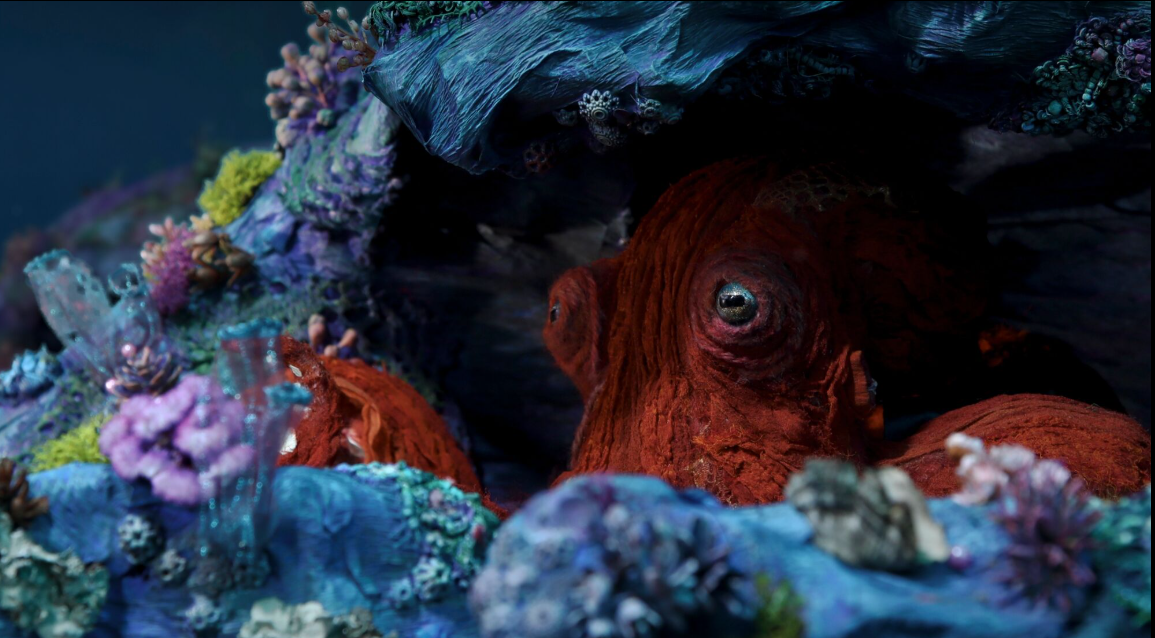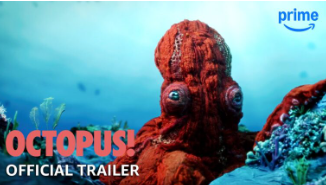Can Octopuses Feel? Emotional Connections Explored in Octopus!
Introduction
What if the most emotionally intelligent creature on Earth wasn’t a human being at all—but a soft-bodied marine mollusk with three hearts, nine brains, and an uncanny ability to change its skin color in response to emotion? As surreal as it sounds, this question is at the heart of Octopus! a captivating new two-part documentary premiering May 8, 2025, on Prime Video. Narrated and executive produced by the ever-brilliant Phoebe Waller-Bridge, Octopus! plunges us into a mysterious underwater realm where emotion, intelligence, and evolutionary wonder converge in one of the most alien beings on Earth.
Created by the award-winning teams at Jigsaw Productions and Wells Street Films and directed through the unique lens of Niharika Desai, this groundbreaking film transcends the boundaries of traditional wildlife documentaries. It blends scientific research, cinematic splendor, and heartfelt storytelling to uncover the emotional lives of cephalopods and what they can teach us about our own.
In this blog, we’ll dive deep into the revelations of the series, break down the scientific insights behind octopus’ emotions, answer common questions, and reflect on the greater significance of these discoveries for marine life, animal rights, and human empathy. Get ready to be enlightened, astonished, and emotionally stirred.
Why Are We So Fascinated by Octopuses?
Octopuses have long intrigued scientists and storytellers alike. With their shape-shifting bodies, intelligence, and remarkable escape abilities, they evoke both awe and curiosity. But in recent years, the fascination has shifted from the physical to the emotional: could these alien-like beings actually feel?
Octopus! doesn’t just investigate their smarts—it challenges us to consider that these creatures may possess a form of emotional intelligence radically different from our own. Through poignant storytelling, immersive visuals, and expert commentary, the documentary explores whether octopuses are capable of affection, curiosity, grief, and even joy.
This isn’t just a scientific curiosity; it’s a cultural and ethical reawakening. As our understanding of animal consciousness grows, so too does the urgency to rethink our relationship with other species—and what it truly means to be sentient.
What the Science Says: Do Octopuses Have Emotions?
1. Neurological Marvels
Octopuses are neurological outliers in the animal kingdom. With approximately 500 million neurons—more than some dogs—they boast a decentralized nervous system, with the majority of their neurons distributed throughout their arms. This allows them to process information and act semi-independently from the central brain, coordinating complex behaviors with astonishing efficiency.
But beyond intelligence, this neural sophistication hints at emotional sentience. A pivotal 2021 study in eScience showed octopuses altering behavior after painful experiences and seeking out pain relief when given the option—behaviors that suggest not just sensation, but awareness and emotion.
2. Social Dynamics & Memory
While many species of octopuses are solitary, exceptions exist. The Larger Pacific Striped Octopus has displayed social cooperation, synchronized movement, and even gentle interactions during mating—evidence of an emerging emotional framework.
In captivity, handlers consistently report individual personality traits and preferences. Some octopuses seek out interaction, recognize specific people, and even engage in play. These signs point to complex memory and the potential for meaningful, if non-verbal, relationships.
3. The Language of Color
Perhaps the most vivid emotional indicators in octopuses come through their skin. These creatures can rapidly change their color and texture for camouflage but also use these changes to express internal states. Deep shades often accompany stress or fear, while lighter tones and slow pulses may suggest calm or curiosity. This real-time visual language offers a window into their emotional experiences, if we’re attentive enough to read it.

Octopus-Human Bonds: Fact or Fantasy?
Can a being with such alien physiology really bond with humans? Octopus! presents a compelling, heartfelt argument that they can—and do. The documentary highlights emotional encounters between octopuses and people that are difficult to dismiss as mere coincidence or anthropomorphism.
In one unforgettable sequence, a diver recounts daily interactions with a wild octopus who brought him seashells, followed him through the reef, and guided him to hidden crevices. In another, a rescued octopus curls its arms around its caregiver’s wrist, refusing to let go during feeding time.
These anecdotes are more than touching—they’re supported by a growing body of scientific literature exploring interspecies relationships, emotional cognition, and behavioral recognition in cephalopods.
Tracy Morgan brings warmth and humor to these stories, enhancing their emotional weight and making them resonate with viewers of all ages.
Frequently Asked Questions (FAQs)
Can Octopuses Bond with Humans?
Yes. Handlers and researchers often observe behaviors indicating memory, preference, and even playful interaction. Though not love as we know it, these behaviors suggest a capacity for connection.
Are Octopuses Self-Aware?
Possibly. While mirror tests remain inconclusive, octopuses demonstrate tool use, forward planning, and problem-solving that point toward a kind of self-awareness and metacognition.
Do Octopuses Get Lonely?
They can exhibit signs of stress and boredom in unstimulating environments, which implies a need for mental and emotional enrichment—even if not traditional companionship.
How Do Octopuses Show Affection?
Through gentle touches, lingering proximity, and color changes. Some octopuses have been known to reach for a familiar person, gently wrap around them, or hover nearby interpreted as signs of recognition and comfort.
Is Octopus! Suitable for Kids and Families?
Absolutely. Its stunning visuals, touching narratives, and approachable science make it a must-watch for viewers of all ages. It’s as educational as it is emotionally profound.
The Emotional Genius of Octopus!
1. The Waller-Bridge Effect
Phoebe Waller-Bridge lends her trademark wit and sincerity to the narration, transforming complex science into emotionally resonant storytelling. Her voice draws connections between the octopus and our own inner lives, inviting deeper reflection.
2. Tracy Morgan’s Unexpected Empathy
Known for comedy, Morgan’s appearances reveal surprising depth. His childlike wonder and candid reactions add a grounded emotional layer that enhances the documentary’s universal appeal.
3. Cinematic Brilliance
Under Niharika Desai’s visionary direction, the cinematography captures rarely seen behaviors in vivid, breathtaking detail. From a color-changing embrace to a daring escape through a bottle’s neck, each moment is a revelation.

Why This Matters: Emotional Empathy and Legal Impact
The United Kingdom made headlines in 2021 when it formally recognized octopuses as sentient beings under its Animal Welfare (Sentience) Bill. This landmark decision reflects a growing awareness that emotional capacity isn’t exclusive to warm-blooded animals.
Documentaries like Octopus! have the power to catalyze similar changes worldwide by nurturing empathy and challenging outdated perceptions. When audiences see these animals not just as exotic curiosities, but as individuals with feelings, it creates momentum for stronger marine protections, ethical treatment in research, and broader compassion in our laws.
What You’ll Feel Watching Octopus!
- Awe: The emotional complexity of these creatures will leave you stunned.
- Connection: You’ll feel a deeper bond with marine life and the natural world.
- Hope: Empathy for an octopus might just be the gateway to empathy for all.
- Wonder: Nature’s surprises are far from over—and Octopus! proves it.
Whether you’re a marine biology buff or a curious newcomer, this documentary will change the way you think about animal intelligence and emotional depth.
Conclusion
The emotional lives of octopuses remain one of the ocean’s greatest mysteries—but Octopus! gives us our most intimate look yet. Premiering May 8, 2025, on Prime Video, it challenges us not only to observe, but to connect.
In a world urgently in need of empathy, perhaps the greatest teacher isn’t human at all—but a soft, shapeshifting creature from the sea.
Notes
Meta Description: Can octopuses feel emotions? Discover the science, stories, and surprising truths behind their emotional intelligence in Octopus, the must-watch Prime Video documentary premiering May 8. Dive into the emotional depth of these mysterious marine creatures.
10 Tags: octopus’ emotions, emotional intelligence animals, Prime Video documentaries, Phoebe Waller-Bridge, Octopus documentary, marine life emotions, animal-human connection, Niharika Desai, octopus-human bond, Jigsaw Productions
5 Longtail Tags: octopus’ emotional connection with humans, can octopuses feel, octopus’ documentary 2025, Phoebe Waller-Bridge Octopus Prime, emotional intelligence in marine animals
Strategies to Consider
- Use Embedded Clips or Teasers – Add short documentary clips to increase engagement.
- Create a FAQ Schema – Use structured data to help FAQs appear in Google’s featured snippets.
- Add Interactive Polls or Quizzes – Let users explore their own emotional intelligence or animal empathy.
- Leverage Influencer Commentary – Include quotes from marine experts and featured talent to enhance credibility.
- Build a Resource Hub – Link to related content and studies to offer added value and improve SEO.
